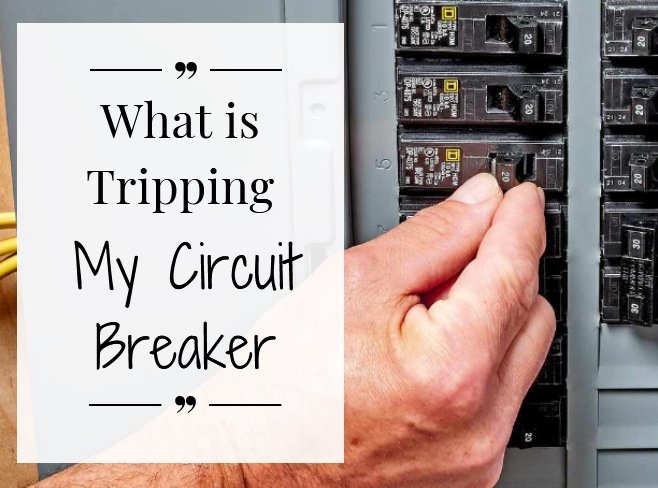How do I find what is tripping my circuit breaker? This is one of many popular questions about the house’s electrical system that has spread on internet forums. The answers are various, but this article has the most straightforward explanation!
Is It Dangerous if Circuit Breaker Keeps Tripping?
Yes, it is! Continuously tripping circuit breakers pose a potential danger. They indicate persistent circuit overloading, which exceeds safe voltage thresholds, increasing the risk of electrical fires. The circuit breaker’s role is critical as it interrupts electricity flow to prevent hazardous situations within your home.

Why is My Circuit Breaker Tripping for No Reason?
The term “No reason” does not make sense. A hidden reason or core issue causes your circuit breaker to trip, indicating that something within your home’s electrical circuits is amiss. In short, experiencing breaker tripping without an apparent cause can signal underlying issues.
Potential culprits include an overloaded circuit, overheated appliance, electrical short, or ground fault problem. When wires touch inappropriately or a ground fault occurs, it can lead to immediate risks. Identifying the precise cause amidst various possibilities can be challenging and frustrating, requiring thorough troubleshooting to resolve the issue effectively.
Expertise Insight: Understanding Electrical Loads
Circuit breakers are designed to handle a specific electrical load, measured in amperes (amps). When the load exceeds the breaker’s capacity, it trips to prevent overheating. This safety mechanism protects your home’s wiring from damage and reduces the risk of electrical fires.
Understanding the capacity of each circuit in your home and distributing electrical devices accordingly is essential to avoid overloading and subsequent tripping.
How do I find out what Tripping My Circuit Breaker is?
Finding the core issues behind your tripping circuit breaker is simple! You can follow several easy steps below to know the factors causing your circuit breakers to trip:
● Identifying the Problematic Circuit
The initial task involves pinpointing the circuit causing the breaker to trip. This can be achieved by turning off all electrical appliances and devices and resetting the main circuit breaker. Gradually switch on individual circuits to isolate the culprit circuit.
Read also: Electric Heater Turns on and off Repeatedly
● Investigating Overloaded Circuits
Overloading a circuit is a frequent cause of breaker trips. Each circuit has a defined capacity measured in amps. If multiple high-power devices are plugged into one circuit, it can surpass its capacity, resulting in a trip. To mitigate this, redistribute devices across different circuits, ensuring a balanced load distribution.
Read also: How Is The Capacity Of A Water Heater Measured
● Detecting Short Circuits
Short circuits occur when a live wire contacts a neutral wire, creating a sudden surge in current. This poses a fire hazard due to excessive heat generation. To identify short circuits, inspect outlets, switches, and cords for damage, fraying, or loose connections. Consulting a licensed electrician is advisable for safe resolution.
● Evaluating Appliance Malfunctions
Malfunctioning appliances are another common trigger for breaker trips. Disconnect suspicious appliances from the circuit and reset the breaker. If the breaker holds, the appliance likely caused the issue. To address faulty appliances promptly, a qualified electrician should perform a professional inspection and repair.
● Examining Outdoor Electrical Systems
Outdoor electrical components can also contribute to breaker trips. Inspect outdoor outlets, lights, and extension cords for damage or exposure to moisture, as these can lead to short circuits. Consultation with an electrician is prudent for waterproofing or replacing affected components.
● Seeking Professional Assistance
Suppose the cause of the breaker trip remains elusive after conducting the steps above. In that case, it might be time to consider installing ground fault circuit interrupters (GFCIs) as a preventative measure. Additionally, seeking assistance from experienced electricians is imperative.
Expert Recommendation: The Role of GFCIs
GFCIs are crucial in protecting against electrical shocks, particularly in areas prone to moisture, such as bathrooms and kitchens. They detect ground faults and immediately cut off the power, preventing potential hazards. Installing GFCIs in your home enhances safety and reduces the likelihood of circuit breaker trips due to ground faults.
Regular Maintenance and Prevention
A comprehensive annual inspection by a licensed electrician is essential to ensure safety and efficiency. Regular maintenance can preempt potential issues and maintain electrical system functionality. This includes checking for wear and tear, testing GFCIs, and ensuring all connections are secure.
Conclusion
Tripping circuit breakers pose significant risks, indicating underlying issues within electrical systems. Continual tripping can lead to hazardous situations, such as fires, necessitating prompt attention.
As a homeowner, you can mitigate risks by identifying problematic circuits, investigating overloads, detecting short circuits, evaluating appliance malfunctions, and examining outdoor electrical systems. Regular maintenance helps prevent future incidents and ensures the safety and efficiency of the electrical system.
Summary Table: Common Causes of Circuit Breaker Trips and Solutions
| Cause | Description | Solution |
|---|---|---|
| Overloaded Circuit | Exceeding the circuit’s capacity with too many devices. | Redistribute devices across multiple circuits. |
| Short Circuit | A live wire touching a grounded surface leads to excessive current flow. | Inspect and repair damaged wiring or connections. Consult an electrician. |
| Ground Fault | A live wire touching a grounded surface, leading to excessive current flow. | Install GFCIs, particularly in moisture-prone areas like bathrooms and kitchens. |
| Faulty Appliances | Malfunctioning appliances drawing excessive current. | Disconnect and inspect appliances. Repair or replace as needed. |
| Outdoor Electrical Issues | Damage or moisture exposure in outdoor outlets, lights, and extension cords. | Inspect, waterproof, or replace affected components. Consult an electrician for repairs. |
Personal Experience: The Importance of Regular Maintenance
As a licensed electrician with over 15 years of experience, I’ve seen the consequences of neglected electrical systems firsthand. Regular maintenance, including thorough inspections and timely repairs, is the key to preventing circuit breaker trips and ensuring a safe home environment. A proactive approach safeguards your property and provides peace of mind.
Addressing circuit breaker tripping promptly and comprehensively can maintain a safe and efficient living environment. Remember, always consult a professional when in doubt to ensure the best outcomes for your home’s electrical system.


